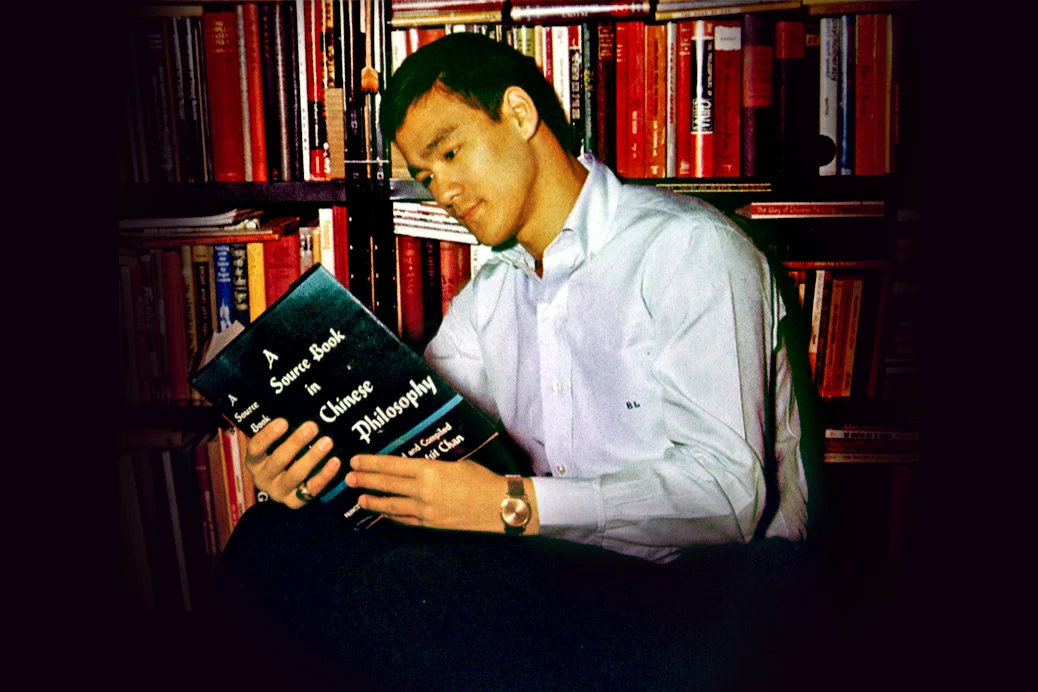#98 Bruce Lee Library - Tao Te Ching
Bruce Lee was a prolific reader; we have around 1,700 books in the Bruce Lee Archive. In the Bruce Lee Library series we will explore different books from Bruce’s library, sharing his annotations and underlined passages, and discussing how these books contributed to Bruce’s philosophy and life.
Bruce Lee was extremely well read, his library had a range of topics on things he was interested in from philosophy to fighting techniques to self-help to acting and directing.
The first book that we will be sharing from the Bruce Lee Library is the Tao Te King by Lao Tzu Interpreted as Nature and Intelligence by Archie J Bahm. Tao Te Ching is an ancient Chinese text written some time during the 5th or 4th century BC and its author Lao Tzu (Old Master) was an ancient Chinese philosopher and writer, and the founder of philosophical Taoism. The book itself is only 81 sections and it’s very poetic. The Tao Te Ching has been translated into Western languages over 250 times.
Wu wei, meaning non-action or not acting, is a central concept of the Tao Te Ching. This is also a concept that Bruce wrote about extensively. Wu wei means not forcing, acting spontaneously, and flowing with the moment.
Chapter I
In Chapter I of the Tao Te Ching, Bruce underlined: “To try to express the inexpressible leads one to make distinctions, which are unreal.” – Lao Tzu
In Bruce’s own writings he wrote: “Do not cling to partiality; see things from totality.” – Bruce Lee
Here Bruce is saying that when you try to express the inexpressible you are making distinctions and compartmentalizing instead of seeing things in totality or as a whole.
In the same Chapter I passage Bruce underlined: “Although the existence of Nature and a description of that existence are two different things, yet they are also the same. “ – Lao Tzu
The Tao Te Ching is written in Classical Chinese and is purposefully written through analogy, repetition, rhyme, paradox, parables, and ancient sayings. It is not a straightforward little book, especially when it is then translated by poetic academics. Bruce took this oblique philosophy and created his philosophy that was more direct and simple.
“Absorb what is useful, reject what is useless, add what is essentially your own.” – Bruce Lee
Anyone can practice this process of simplifying philosophies to better apply them to everyday life.
Chapter II
In Chapter II, Bruce underlined: **“It is because we single out something and treat it as distinct from other things that we get the idea of its opposite. Beauty, for example, once distinguished, suggests its opposite, ugliness.
#In fact, all distinctions naturally appear as opposites. And opposites get their meaning from each other and find their completion only through each other. The meanings of “is” and “is not” arise from our distinguishing between them.” – Lao Tzu**
We tend to think of opposites as in opposition to each other, but really they derive their meaning from each other and there cannot be one without the other. Like yin yang, these opposites of hot and cold or beauty and ugliness find their completion in one another.
“The two forces (yin-yang), although they appear in conflict, in reality are mutually interdependent; instead of opposition, there is cooperation and alternation.” – Bruce Lee
Also in Chapter II Bruce underlined: “Therefore the intelligent man accepts what is as it is. In seeking to grasp what is, he does not devote himself to the making of distinctions which are then mistaken to be separate existences.” – Lao Tzu
In Bruce’s writings he says: “Stand at the neutral point between negative and positive, no longer directing one’s mind to anything. The non-grasping mind; the sticky mind; one cannot follow what is if one is anchored down to one partialized view.” – Bruce Lee
Bruce believed that having a non-grasping mind allowed better flow in life.
Bruce underlined this in Chapter II: “In teaching, he teaches, not by describing and pointing out differences, but by example.” – Lao Tzu
There are many teachers who know the information and who teach the information, but do not live it. Bruce Lee was a man who had his own struggles, but he truly tried to live his life authentically, practicing his own philosophies instead of just teaching them or writing about them.
Bruce wrote: “I am no teacher; I can merely be a signpost for a traveler who is lost.” – Bruce Lee
Bruce had a lot of humility when it came to being a teacher. He did not want to be the guru at the front of the room instructing students how to live their lives, but rather act as a guide and living by example. These days there are so many people acting as gurus, and all they desire is to be propped up as a guru by their students buying their stuff and feeding their ego.
Chapter III
In Chapter III, Bruce underlined the following passages:
“If no distinctions of superiority and inferiority prevail among officers, they will devote themselves to their tasks rather than to rivalries with one another. He does not promote ambition to improve their status, but supports their self-sufficiency. By being calm and contented himself, he sets an example for his people.” – Lao Tzu
In the Tao Te Ching, there is a lot on how to be a real leader. When you, the leader or teacher, are calm and contented, then you are setting the example for those who are watching you. It is not about what you say; it is about what you do.
In Chapter IV:
“In Nature, all natures originate, all conflicts are settled, all differences are united, all disturbances are quieted.” – Lao Tzu
This part really resonates with Bruce’s idea about living the oneness of things.
In Chapter V:
“#In conflicts between opposites, the more one attacks his seeming opponent (upon which he really depends for his completion), the more he defeats himself (and thereby demonstrates that only Nature, and not any opposite abstracted from existence, is self-sufficient).” – Lao Tzu
Bruce Lee wrote: “There is no opponent, only an illusion to see through.” – Bruce Lee
When you take Bruce Lee’s writings and apply it to life outside of martial arts, then the opponent is really ourselves. We need to examine ourselves in order to grow.
In Chapter VI: “#Opposition is the source of all growth.” – Lao Tzu
Often we want to dodge conflict because it seems too difficult to deal with. If you have this ideal of wanting everything to be ok and easy, then you risk losing yourself by agreeing with everyone and everything around you in order to avoid conflict. By coming up against roadblocks, you grow by dealing with the block instead of allowing it to stop you. Always ask, “What is this here to teach me?”
Bruce wrote: “Be pliable. When man is living, he is soft and pliable. Pliability is life. To change with change is the changeless state. We grow through conflict. Without frustration, you might discover what you can do for yourself.”- Bruce Lee
When you have the opposition, instead of fighting it reactively or aggressively, be in flow with it and accept that it is a gift of your own development.
From Chapter VII: “Since he does not take sides, he never loses a battle.” – Lao Tzu
If you can stand in neutrality and see things as they truly are without making distinctions, then you are better able to work through the path of life with less conflict.
From Chapter IX: “Going to extremes is never best.” – Lao Tzu
For Bruce, his first plaque in his Stages of Cultivation plaques is the yin yang symbol with separate halves and no circles in the halves. He called this “Partiality: The Running to Extremes.” The extremes are where we start, not where we want to go.
“For if you make a blade too sharp, it will become dull too quickly.” – Lao Tzu
Bruce Lee wrote about a parable of a butcher who’s knife never goes dull. His knife is never dull because he goes along the bone instead of hacking into the bone.
Sometimes we are attached to the extreme being better. That everything has to be hard or else it is not worthy. Going to extremes is not sustainable or best.
Underlined from Chapter XII:
“Interest in the varieties of color diverts the eye from regarding the thing which is colored.
Attention to the differences between sounds distracts the ear from consideration of the source of the sounds.
Desire for enjoyment of the various flavors misdirects the appetite from seeking foods which are truly nourishing.
Excessive devotion to chasing about and pursuing things agitates the mind with insane excitements.
Greed for riches ensnares one’s efforts to pursue his healthier motives.” – Lao Tzu
These underlined passages all contribute to Bruce’s idea of seeing things as they are and not getting attached to anything.
“It's like a finger pointing away to the moon. Do not concentrate on the finger or you will miss all of the heavenly glory!" – Bruce Lee
Zooming out to see the whole picture helps give you perspective when you are working on a goal, so that you do not focus on the superficial prizes that can be associated with your ultimate goal.
“The intelligent man is concerned about his genuine needs and avoids being confused by dazzling appearances.” – Lao Tzu
This directly relates to Bruce’s concept of self-actualization versus self-image actualization. If you are obsessed with the outside accolades then you can miss the opportunities for growth that help you find your root and achieve self-actualization. By only seeking the glitzy rewards, you ignore what actually nourishes your soul.
Be willing to give yourself space to experience something or engage in a process.
From Chapter LXXIII:
“He whose courage expresses itself as defiance is often put to death. He whose courage manifests itself as patience to endure insult continues to live.” – Lao Tzu
From Chapter LXXXI:
“He who is intelligent is not quarrelsome.” – Lao Tzu
Bruce has many writings about how, “Patience is concentrated strength,” and that he who can bear insult with grace can accomplish so much more than he who is in defiance all of the time.
Take Action: Go out and read a book that you really like and take an analog process by underlining and annotating parts that resonate with you.
You can buy the version of the Tao Te Ching we discuss here:
We’d love to hear from you! Write to us at hello@brucelee.com or tag us @brucelee on social media with #bruceleepodcast.
We get many emails requesting advice with “What would Bruce Lee do?” and would like to start a “What would Bruce Lee do?” section of the podcast where Shannon and Sharon respond to your emails for advice. If you need advice and are wondering, “What would Bruce Lee do?” write to us at hello@brucelee.com


